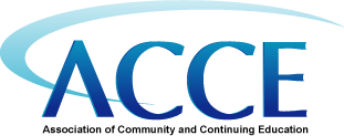The co-enrollment of fee-based and credit students has been a topic at the System Advisory Committee on Curriculum (SACC), one of several statewide committees at which ACCE members attend to advocate for our programs. Erica LeBlanc attended the June 2016 meeting on behalf of the ACCE and came back with an up to the minute report on this topic at the state level.
For several years, SACC has requested representatives from CCCCO’s Legal Department to provide advice and direction to enable colleges to combine enrollment of fee-paying students and credit seeking students. Several years ago, the CCCCO’s then-legal representative indicated that title 5 did not preclude this approach and several members of ACCE’s Board worked with CCCCO representatives to develop guidelines to enable colleges to pursue this option. For classes, like orchestra and other performance-based classes where community involvement is needed, this option would be a viable way to accommodate students who are locked out of classes due to repeatability restrictions on credit classes.
Although, as mentioned, the CCCCO previously indicated this practice was acceptable. The current opinion from the CCCCO is there are many challenges that would have to be overcome and some are of the opinion this option would not be appropriate for colleges to pursue.
At the June 2016 SACC meeting, the co-enrollment of Community Education and credit students was again a hot topic. SACC heard from Elias Regalado, Director of Fiscal Standards and Accountability, who has a number of concerns which he brought to the discussion.
Although the list of challenges is daunting, Erica feels it is a positive step that the discussion is moving forward. It has been on the agenda for over two years, but now we know the CCCCO’s specific concerns about co-enrolling fee-based and credit students. One of the issues is whether the Education Code, when written, considered this to be a viable approach. This argument was countered by the point that the Education Code, when written, had not considered repeatability limitations on credit enrollment either. Another concern is the effect this might have on Full-time Faculty Obligation Number (FON).
The good news is SACC, the membership of which includes representatives from the CIOs, ASCCC, and CCCCO, are in support of this approach, at least for some classes. Another option that SACC is pursuing is changing the Title 5 language regarding auditing. Whether to allow students to audit classes is a local decision, but the current Title 5 language limits the enrollment fee to $15 per unit, which is well below the cost of instruction. SACC is pursuing a change to reflect a more broad language that would allow each college to determine the cost of instruction as it applies to auditing courses. Addressing this topic first might be a good intermediate step. The bottom line is that we now have a certain amount of traction on this long standing item that we did not have before. This topic will be carried over into next year.
Thank you, Erica, for your report! ACCE plans on conducting further statewide discussions on this topic, along with breakout sessions at upcoming conferences.
For several years, SACC has requested representatives from CCCCO’s Legal Department to provide advice and direction to enable colleges to combine enrollment of fee-paying students and credit seeking students. Several years ago, the CCCCO’s then-legal representative indicated that title 5 did not preclude this approach and several members of ACCE’s Board worked with CCCCO representatives to develop guidelines to enable colleges to pursue this option. For classes, like orchestra and other performance-based classes where community involvement is needed, this option would be a viable way to accommodate students who are locked out of classes due to repeatability restrictions on credit classes.
Although, as mentioned, the CCCCO previously indicated this practice was acceptable. The current opinion from the CCCCO is there are many challenges that would have to be overcome and some are of the opinion this option would not be appropriate for colleges to pursue.
At the June 2016 SACC meeting, the co-enrollment of Community Education and credit students was again a hot topic. SACC heard from Elias Regalado, Director of Fiscal Standards and Accountability, who has a number of concerns which he brought to the discussion.
Although the list of challenges is daunting, Erica feels it is a positive step that the discussion is moving forward. It has been on the agenda for over two years, but now we know the CCCCO’s specific concerns about co-enrolling fee-based and credit students. One of the issues is whether the Education Code, when written, considered this to be a viable approach. This argument was countered by the point that the Education Code, when written, had not considered repeatability limitations on credit enrollment either. Another concern is the effect this might have on Full-time Faculty Obligation Number (FON).
The good news is SACC, the membership of which includes representatives from the CIOs, ASCCC, and CCCCO, are in support of this approach, at least for some classes. Another option that SACC is pursuing is changing the Title 5 language regarding auditing. Whether to allow students to audit classes is a local decision, but the current Title 5 language limits the enrollment fee to $15 per unit, which is well below the cost of instruction. SACC is pursuing a change to reflect a more broad language that would allow each college to determine the cost of instruction as it applies to auditing courses. Addressing this topic first might be a good intermediate step. The bottom line is that we now have a certain amount of traction on this long standing item that we did not have before. This topic will be carried over into next year.
Thank you, Erica, for your report! ACCE plans on conducting further statewide discussions on this topic, along with breakout sessions at upcoming conferences.

 RSS Feed
RSS Feed
